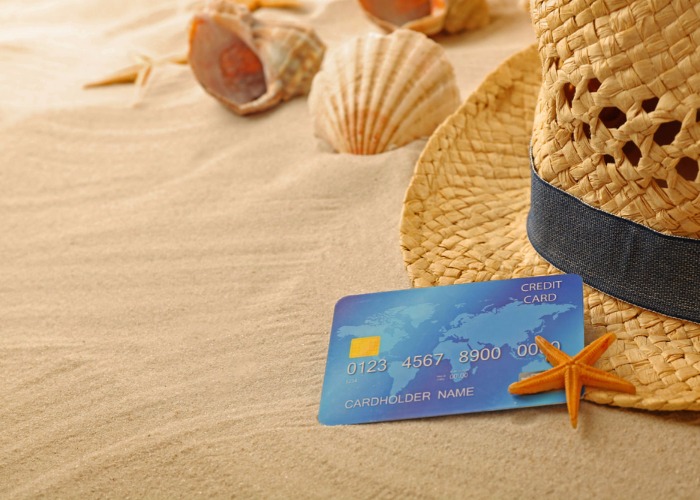Dodging foreign usage fees: why you need a holiday bank account

Opening an account with a bank that doesn’t charge fees on overseas use makes holiday money far less stressful.
One of my least favourite parts of any holiday has always been sorting the spending money.
Thankfully I’ve never been the sort of person to leave it to the last minute, whether that’s using a bureau de change in the airport or even simply withdrawing from an ATM once I’ve arrived.
No, I’ve always organised the money in advance, in recent years ditching the old favourite of the Post Office in order to get a better return by picking up my money from the likes of Travelex.
But this then meant travelling around town with all of that spending money in my wallet or in my bag, which has always made me feel uncomfortable.
And then when the time comes for the holiday itself, there’s transporting it in your suitcase, splitting it up so that you’ve got some euros in each shoe, some hidden in your washbag, just in case some bag handler tries their luck and has a rifle through your stuff to try to pinch your valuables.
It’s no fun.
Avoid rip-off fees on your next holiday with one of these bank accounts
Enter Monzo
A couple of weeks ago, my wife and I went off on our first international trip in almost a decade; a couple of days in Barcelona.
And given my dislike of worrying about carrying all of your spending money in transit, I decided to put one of the new online banks to the test.
Monzo promises users that they can make payments abroad without having to pay any additional fees or charges, while you can also withdraw up to £300 a month from overseas ATMs without facing any extra fees either – you can read our roundup of the cheapest banks to use abroad here.
It has a host of other snazzy features that might appeal to account holders, such as the chance to divide your money up into ‘pots’ to help you budget, and the fact that you open the account incredibly quickly, all through its app, certainly marks it out from the usual process with high street banks.
But for me, the selling point was simply the fact that I could use it on our trip, wherever and whenever we needed spending money.
And it was absolutely brilliant ‒ any time we needed to spend money, whether on entry to the Picasso museum (not my idea) or an impromptu meal out (very much my idea), it did the job.
There were even app reminders every time money was spent, so that I knew exactly how much I had left in sterling.
Consider me a convert ‒ I genuinely think that if you’re heading off on and want a convenient way to handle your spending money, an account that offers fee-free spending is a must.
Avoid rip-off fees on your next holiday with one of these bank accounts
I’ve tested prepaid cards in the past, where you load them up with a foreign currency and then use it as need be.
And while they do a decent job, there are certain aspects to them that I’m really not wild about.
A good example is the fact that some of them levy a charge when they are used in the UK. So if you come home with spending money that you haven’t actually used, then it will actually cost you a fee to get your hands on it.
Others will charge you a fee for inactivity ‒ so if you don’t use it for 12 months, then you’ll start paying a fee, wiping out any money left on there.
Besides, a Monzo account has the added bonus of working as an emergency back-up bank account, should my main bank have an IT meltdown a la TSB.
Don't forget the travel insurance! Compare quotes with loveMONEY
There is a sacrifice
Of course, for the sake of convenience, you may end up giving up some of your spending power.
Convert your money in advance of your trip and, if you time it right, you may end up with a much better exchange rate than leaving it until you actually go to spend money on the trip.
This week the Bank of England warned that not only is a no-deal Brexit looking more likely, but that the uncertainties over our withdrawal from the EU has already led to “a decline in the sterling exchange rate”.
If we do end up with a “disorderly Brexit”, which isn’t exactly out of the question, that is only going to hurt the exchange rate further.
So if you have a holiday planned for the end of the year and your main focus is getting the best possible exchange rate, it probably makes sense to change that cash up now rather than go with a ‘wait and see’ approach.
Similarly, there will be some holidays where it’s just not appropriate. If you’re heading somewhere remote, where you won’t have ATMs on every street or shops that accept card payments, it’s not really going to work.
An account from Monzo, N26, Revolut or any other of the new banks that have spotted fee-free use abroad as a way to stand out from the crowd, will not be for everyone. But personally, I’m in no rush to go back to the old way of sorting my spending money.
How do you go about minimising fees while abroad? Share your tips in the comments section below.
Avoid rip-off fees on your next holiday with one of these bank accounts
Comments
Be the first to comment
Do you want to comment on this article? You need to be signed in for this feature